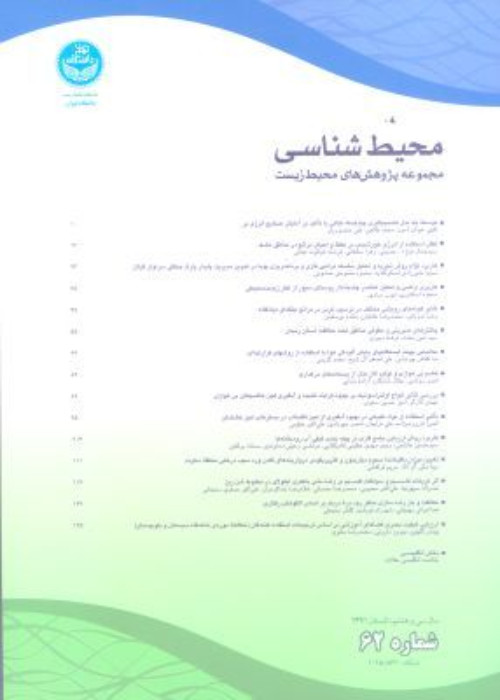Environmental Planning for Industrial Waste Management with Industrial Ecology Approach Case Study: Ahvaz Industrial estate No. 2
One of the important points of establishing industrial state is that more attention can be paid to industrial ecology. Due to the current situation of industrial waste, solutions for the realization of the category of industrial ecology of waste management in the second town of Ahvaz have been presented.The purpose of environmentally friendly industrial estates is to improve the economic performance of existing companies by minimizing the environmental impact of them on the environment. The subject of industrial ecology is a new topic in the world which has considered recently by development countries in their industrial states. In fact, industrial ecology considering saving more raw materials and financial investment by moving from close system which are wasting some raw material toward open system which using wastes as a raw material for other production units. In this study, the current status of waste materials of active industrial units were evaluated through site inspection and carrying out a survey. The collected information from industrial units were imported into the Excel model and the quality and quantity of industrial waste have been analyzed. The current model is classified all waste materials into 4 groups, reusable by the unit, reusable by nearby units in the same state, reusable by far units of other states and special wastes which have different procedures.As a result, by managing of various types of waste materials such as types, storage amounts, reusing amounts and recovery of waste materials have been evaluated by focusing more on the parameters involved in industrial ecology system.
This study covers identification of industrial wastes in active Ahvaz industrial state No. 2 in terms of quantity and quality and the establishment of ecological system which is the same design of waste management systems. Special waste products need specific waste management. Industries is looking for minimum risk of pollution for the environment, in addition to preserving natural resources. Investigation and identification of waste products is carried out for active industrial states. All of the necessary information including raw materials entering the production line, production products and production capacity, production waste in the form of industrial waste and normal waste, current methods of waste management by the industrial unit were collected and validated. In some cases, site inspection and face-to-face interviews carried out with professional people. Then, the collected information was entered into an Excel model and all wastes were classified based on the name of the town, type of industrial unit, type of production waste, amount of production waste, , Iranian approved Basel codes and current management methods. Then, quantitative, and qualitative analysis of industrial waste was performed based on the desired methods.According to the information collected in the previous stages, which included waste classification, knowledge of the production process and the activity of industrial units in the industrial state, finally to provide practical solutions to optimize the management of industrial waste in the state, the feasibility of establishing an industrial ecology system carried out in the that industrial state. The desired industry and how to perform the parameters of industrial ecology in these settlements were discussed in each stage.The first type of industrial ecology system which is linear and may damage the environment, because we have only inputs and outputs. The second type, which is a quasi-circular system and is done as a process, and the third type, which is completely circular and does not cause any damage to the environment, ie no waste enters the environment. Production processes in an industrial ecosystem simply convert the amount of material in circulation from one form to another. Of course, this recovery still requires energy and the production of waste and harmful by-products, with the minimum level than current now. Industrial ecology is the transformation of industry from linear systems which all resources are imported into a closed-loop system . in fact, all produced wastes can be feed for new processes and play an effective role in protecting the environment.
This study’s model has classified all waste materials into 4 groups, reusable by the unit, reusable by nearby units in the same state, reusable by far units of other states and special wastes which have different procedures. As a result of this study in the industrial state of Ahvaz No. 2, a total of 26 types of industrial waste products have been evaluated which 9 types of them were in the first group, 4 types of them were in the second group and 11 types were in the third group of the industrial ecology system. Also, 12 types of wastes materials in Ahvaz were in two phases of solid and liquid of special wastes.The best and most important way to establish an industrial waste ecology system (minimum pollution) in each unit is to change process variables such as change in feed, using new technology, and upgrading equipment. Changing the production method is one of the common methods of reducing pollutants, which is usually costly, but the recycling and reuse of industrial waste is of particular importance.In many industrial units, reusing and recycling of waste generally has more beneficial for the business owners, and economic efficiency is an important incentive for industrial units to carry out pollution reduction operations. In many cases, by performing simple processes on waste materials, these materials can be reused as feed in other industries.To achieve the mentioned changes with the objective of minimizing of wastes materials, the major role of industries and experts should be considered as executive arms of the industrial ecology system for waste management. Establishing policies and procedures by Industry and mining government organization and monitoring system by Environmental department are necessary for management of waste products in State industries in Iran. monitor the implementation of environmental issues.
According to site surveys, a total of 15 types of industrial wastes and 11 types of special wastes are produced in Ahvaz industrial state No. 2. In total 14 type of industrial and 5 types of special wastes can be recycled. Also, 9 type of the industrial wastes and 2 types of special wastes can be reused in the same production unit. The most common types of industrial waste produced in Ahvaz industrial state No. 2 are wood and cellulose waste, followed by reference food waste, metal and concrete waste. Most of the special production wastes in Ahvaz industrial state No. 2 are related to wastes of oil sludge, foam, and glue. In the Ahvaz industrial state, the capital production per waste of the solid phase is more than the liquid phase. Also, the highest capital per waste is related to industrial waste, then special and finally normal, respectively.All waste of the industrial state can be used in the industrial ecology system, a high percentage of which can be reused in the same state, some of them can be sold for recycling in the same state or adjacent state or can be used by the industrial state management.
- حق عضویت دریافتی صرف حمایت از نشریات عضو و نگهداری، تکمیل و توسعه مگیران میشود.
- پرداخت حق اشتراک و دانلود مقالات اجازه بازنشر آن در سایر رسانههای چاپی و دیجیتال را به کاربر نمیدهد.



